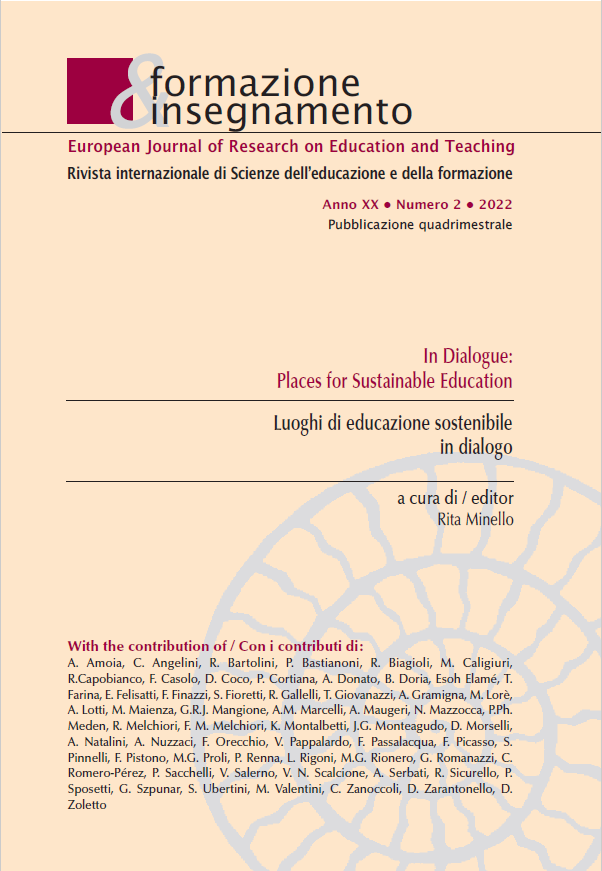“Action Competencies” and School Inclusion through Education for Sustainable Development
DOI :
https://doi.org/10.7346/-fei-XX-02-22_11Mots-clés :
Inclusion, Environment, Equity, Sustainability, CompetenciesRésumé
Education for Sustainable Development is part of a broad organizational framework governed in the first instance by the UNESCO Recommendations on Education for International Understanding, Cooperation and Peace. It is not, therefore, the exclusive domain of environmental or technological disciplines: Education for Sustainable Development is marked by a humanistic-transformative orientation. How can we contribute to the development of the action competencies starting from the paradigm of school inclusion? This article proposes to address this question with the aim of redesigning activities within an ecological framework.
Références
Alessandrini G. (2019). Attualità del capability approach in Europa e scenari della sostenibilità in G. Alessandrini (Eds.), Sostenibilità e capability approach. Franco Angeli.
Conferenza Nazionale sull’Educazione Ambientale e allo Sviluppo Sostenibile, Tavolo Agenda 2030: educazione allo sviluppo sostenibile, modelli innovativi di impresa e di consumo. Roma, 22-23 novembre 2016.
Nussbaum, M. (2002). Giustizia e dignità umana. Il Mulino.
Rockström, J. & Sukhdev, P. (giugno 2016). Keynote speech, EAT Stockholm Food Forum. Disponibile in: https://eatforum.org/learn-and-discover/keynote-speech-prof-johan-rockstrom-ceo-pavan-sukhdev/ [27/02/2022].
Piccioli, M. (2018). Educazione allo sviluppo sostenibile e Index for inclusion. Un’indagine esplorativa sul quadro valoriale degli insegnanti di scuola primaria, in E. Fellin (Eds.), Questa Terra è la mia Terra. Educazione alla cittadinanza e civiltà planetaria, 73-81. Zerosei Up.
Scardovelli, M. (2004). Gruppi d’ascolto e formazione personale in G. Manarolo e M. Borghesi (Eds.), Quaderni italiani di musicoterapia, 408-413. Cosmopolis.
Terzi, L. (2013). Disabilità e Uguaglianza Civica: la prospettiva del Capability Approach. Italian Journal of Disability Studies 1 (1).
UNESCO (2021). World Conference on Education for Sustainable Development. Berlin Declaration on Education for Sustainable Development; Learn for our planet: Act for sustainability. Online.
UNESCO (2016). Findings of the 6th consultation on the implementation of the 1974 Recommendation concerning Education for International Understanding, Cooperation and Peace and Education to relating to Human Rights and Fundamental Freedoms. Progress on education for sustainable development and global citizenship education. Disponibile in: https://unesdoc.unesco.org/ark:/48223/pf0000266176 [27/02/2022].
Vehmas, S. (2015). I bisogni educative speciali, un’analisi filosofica in R. Medeghini (Eds.), Norma e normalità nei Disability Studies.Trento: Erickson.
Téléchargements
Publié-e
Comment citer
Numéro
Rubrique
Licence
(c) Tous droits réservés Matteo Maienza 2022

Cette œuvre est sous licence Creative Commons Attribution 4.0 International.
Formazione & insegnamento est distribué sous licence Attribution 4.0 International (CC BY 4.0).
Pour plus de détails, veuillez vous référer à notre Politique de dépôt et d’archivage ainsi qu’à nos Conditions de droits d’auteur et de licences.





